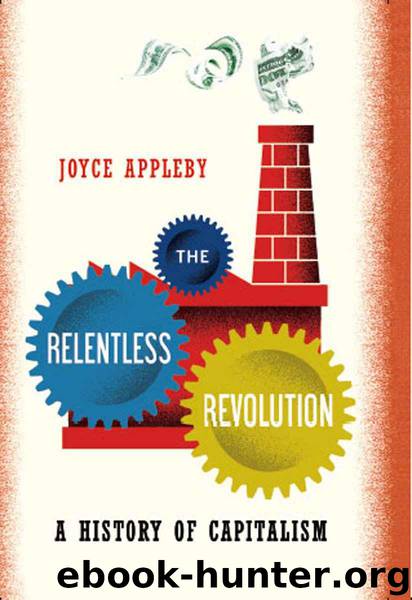The Relentless Revolution: A History Of Capitalism by Joyce Appleby

Author:Joyce Appleby
Language: eng
Format: mobi, epub
Tags: Economic History
Publisher: W. W. Norton & Company
Published: 2010-01-03T15:00:00+00:00
9
WAR AND DEPRESSION
IN 1914 WAR CAME to Europe through the measured minuet of mobilizing armies. It was a slow dance. When discretion suggested to some countries to start early to get their forces ready, prudence dictated to others that they must not be left behind. Many nations had sought safety in numbers as international tensions tightened. These alliances only multiplied the occasions for triggering hostilities. Germany and the Austro-Hungarian Empire, later joined by the Ottoman Empire, faced Great Britain, Russia, and France. The wealth that capitalism had generated in the preceding half century enabled all these prospective belligerents to build big armies and trade in their wooden naval vessels for steel-plated battleships. The military scoured industrial plants for promising improvements. Corporations like England’s Vickers poured its profits into the development of armament, as did its competitor Krupp, the German manufacturer of iron and steel. The heady feeling that came from their worldwide resources created feelings of invincibility among Europe’s leaders.
The race for industrial superiority that had fueled Germany’s impressive development in the nineteenth century entered a second lap in the competition for colonies with Great Britain at the end of the nineteenth century. Both stoked the fires of national militancy. The jingoism that had justified the imperial ambitions of each country soon justified an arms race. Propaganda, a word that got a new meaning in this period, spread aggressive messages about national superiority. The eagerness with which the combatants in World War I cultivated the means and motives for going to war still astounds. It is hard not to see its outbreak in 1914 as overdetermined, even though there weren’t really any causes for it, if you except widespread imprudence and massive miscalculations.
Contemporaries’ skill at solving international disputes did not match their demonstrated capacity to create wealth. The expectation that any war would be a short one like the Franco-Prussian War of 1870–1871 contributed to the rampant bellicosity. Few bothered to remember the bloodbath of the American Civil War in 1861–1865.
Europe had not seen a total war since the sixteenth century. Perhaps Americans’ vivid memories of their civil war explains why the United States didn’t enter the European conflict until 1917, after it had been raging for three years. By that time everyone had been disabused of the notion that the fighting wouldn’t last long. Instead grinding, stupid, indefensible trench warfare took on a kind of permanence along what came to be known as the western front. Just how bad things were going to be became apparent in the first three months of the war, when a million and a half soldiers died in battle.
Such casualties only increased the two sides’ determination to prevail. Making sense of such horrendous losses to the public meant ratcheting up descriptions of the villainy of one’s enemy. At least sixty-four million Europeans were mobilized in addition to three million outside Europe. Russia alone had an army of twelve million. Of the total sixty-four million soldiers and sailors, eight and one-half million died, twenty-one million were wounded, and another seven million were declared missing in action.
Download
The Relentless Revolution: A History Of Capitalism by Joyce Appleby.epub
This site does not store any files on its server. We only index and link to content provided by other sites. Please contact the content providers to delete copyright contents if any and email us, we'll remove relevant links or contents immediately.
| Archaeology | Essays |
| Historical Geography | Historical Maps |
| Historiography | Reference |
| Study & Teaching |
Underground: A Human History of the Worlds Beneath Our Feet by Will Hunt(12097)
Sapiens by Yuval Noah Harari(5369)
Navigation and Map Reading by K Andrew(5156)
The Sympathizer by Viet Thanh Nguyen(4390)
Barron's AP Biology by Goldberg M.S. Deborah T(4150)
5 Steps to a 5 AP U.S. History, 2010-2011 Edition (5 Steps to a 5 on the Advanced Placement Examinations Series) by Armstrong Stephen(3733)
Three Women by Lisa Taddeo(3433)
Water by Ian Miller(3184)
The Comedians: Drunks, Thieves, Scoundrels, and the History of American Comedy by Nesteroff Kliph(3079)
Drugs Unlimited by Mike Power(2594)
A Short History of Drunkenness by Forsyth Mark(2297)
DarkMarket by Misha Glenny(2212)
And the Band Played On by Randy Shilts(2206)
The House of Government by Slezkine Yuri(2206)
The Library Book by Susan Orlean(2069)
Revived (Cat Patrick) by Cat Patrick(1991)
The Woman Who Smashed Codes by Jason Fagone(1973)
The Absolutely True Diary of a Part-Time Indian by Sherman Alexie(1913)
Birth by Tina Cassidy(1903)
